新概念英语第一册Lesson 73-74 课件 (共46张PPT)
文档属性
| 名称 | 新概念英语第一册Lesson 73-74 课件 (共46张PPT) | 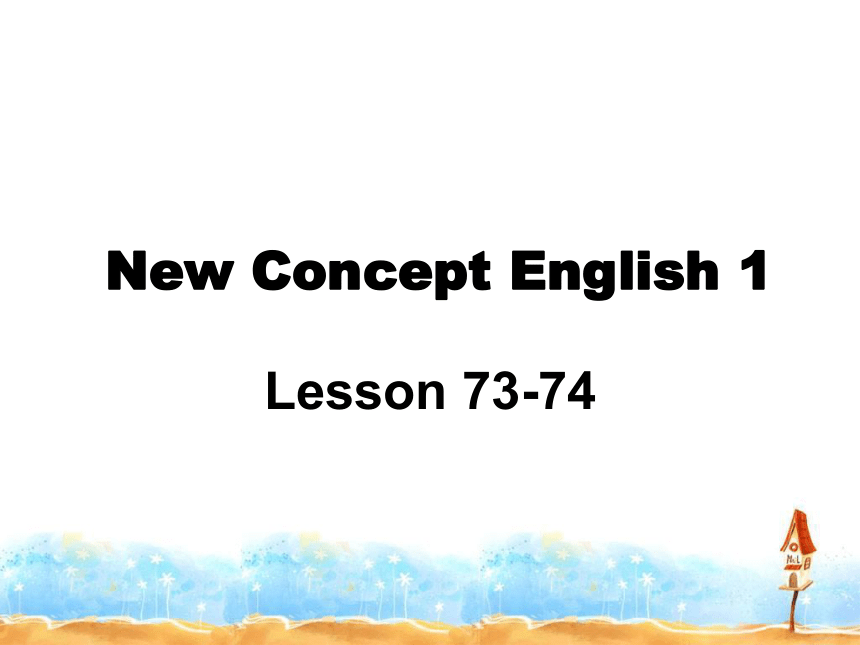 | |
| 格式 | ppt | ||
| 文件大小 | 3.4MB | ||
| 资源类型 | 教案 | ||
| 版本资源 | 新概念英语 | ||
| 科目 | 英语 | ||
| 更新时间 | 2024-01-06 08:36:28 | ||
图片预览


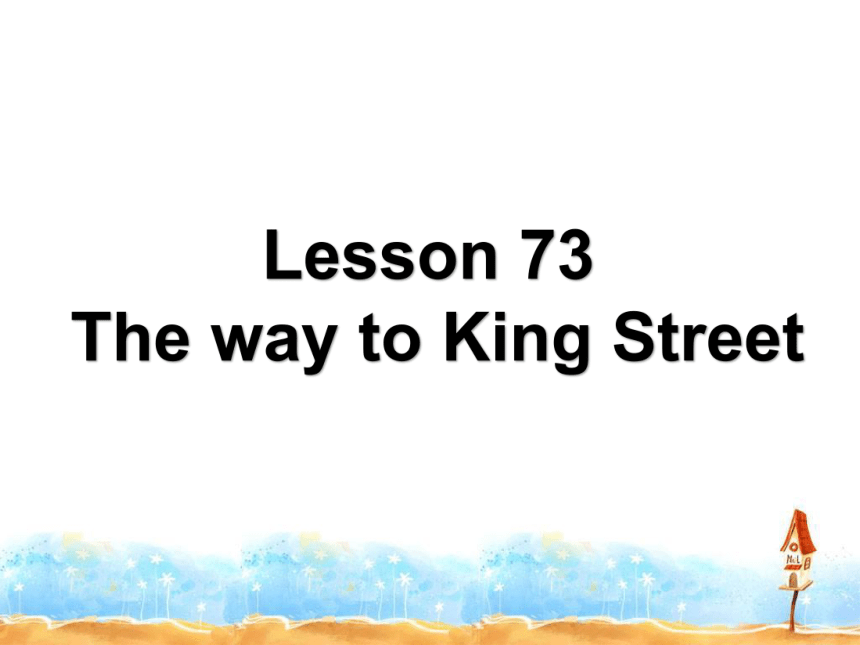
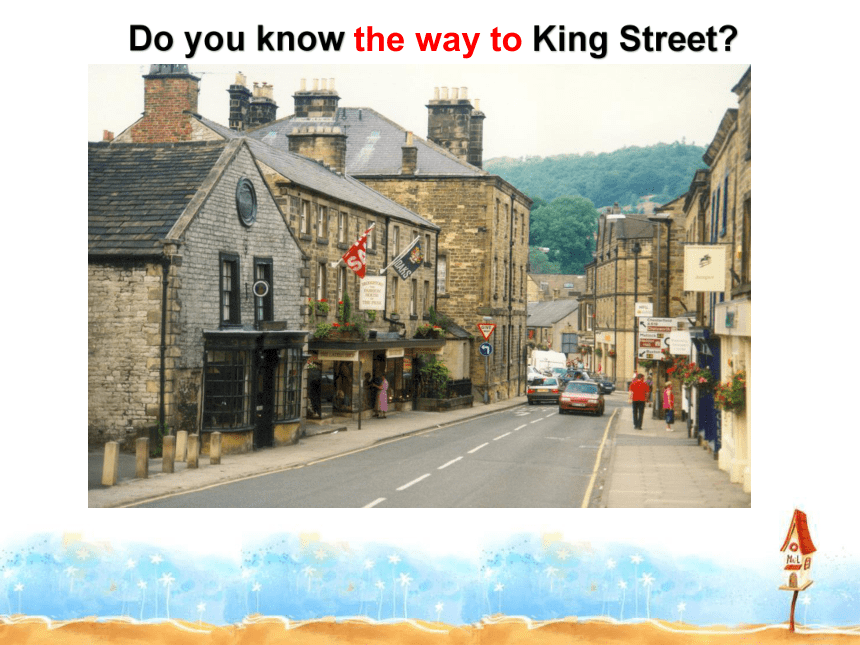
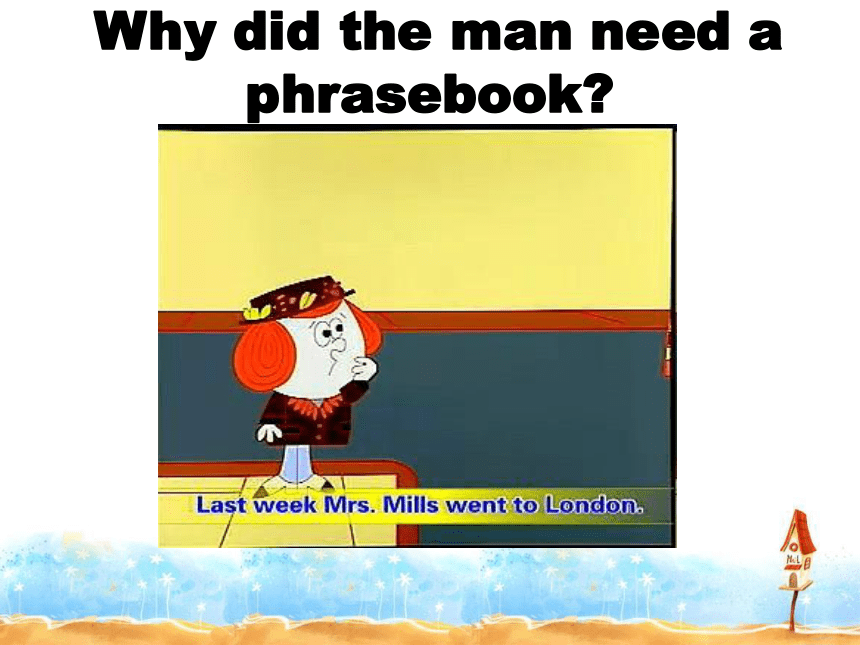
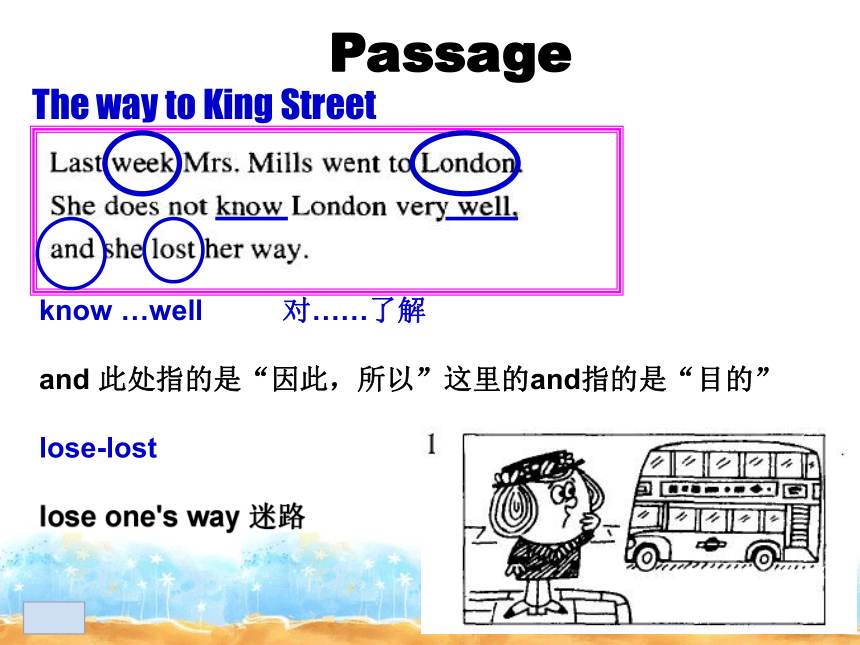
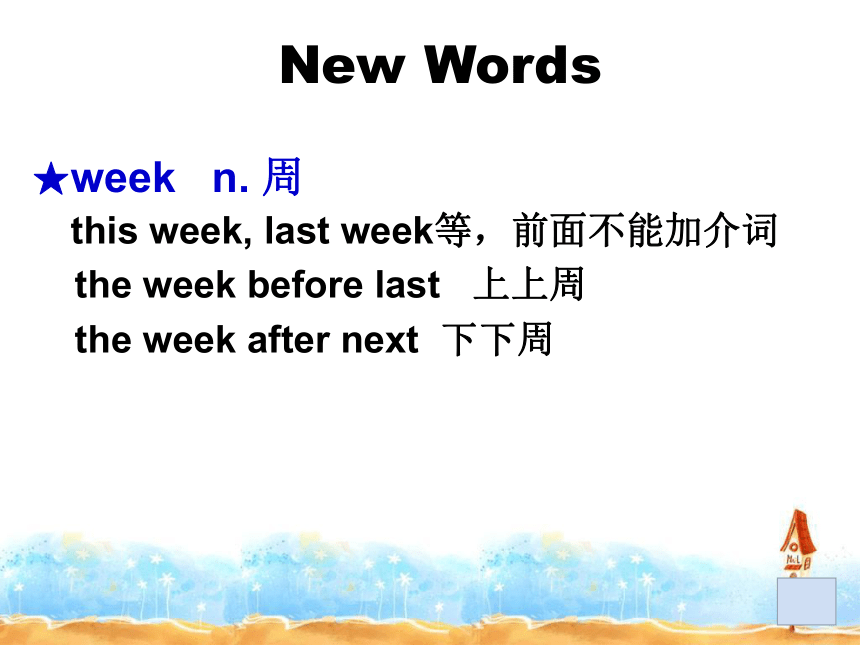
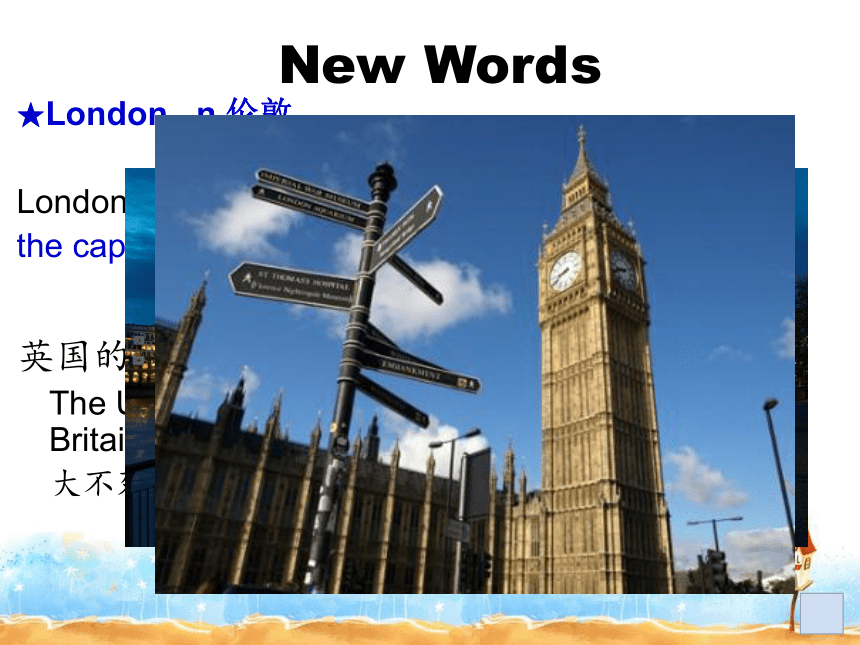
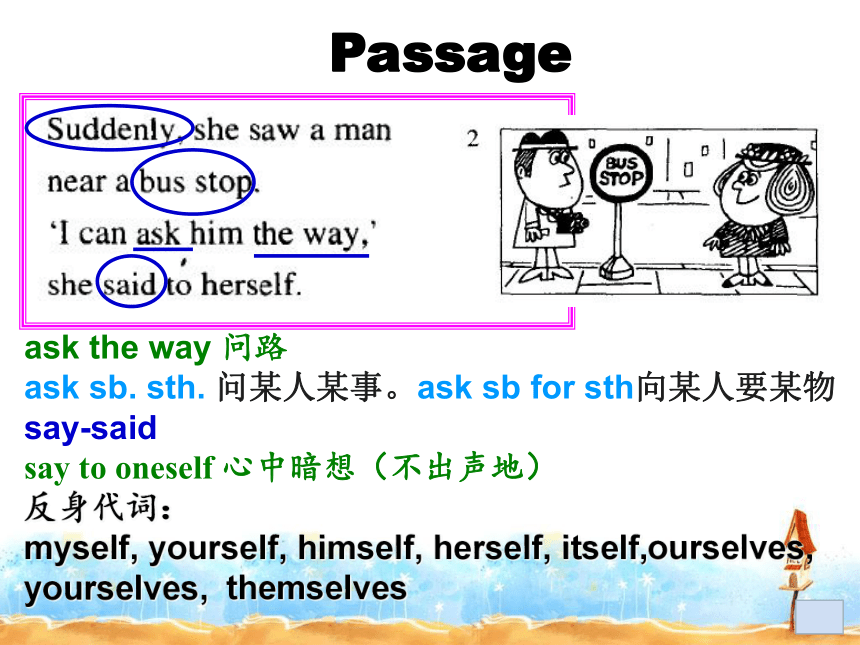
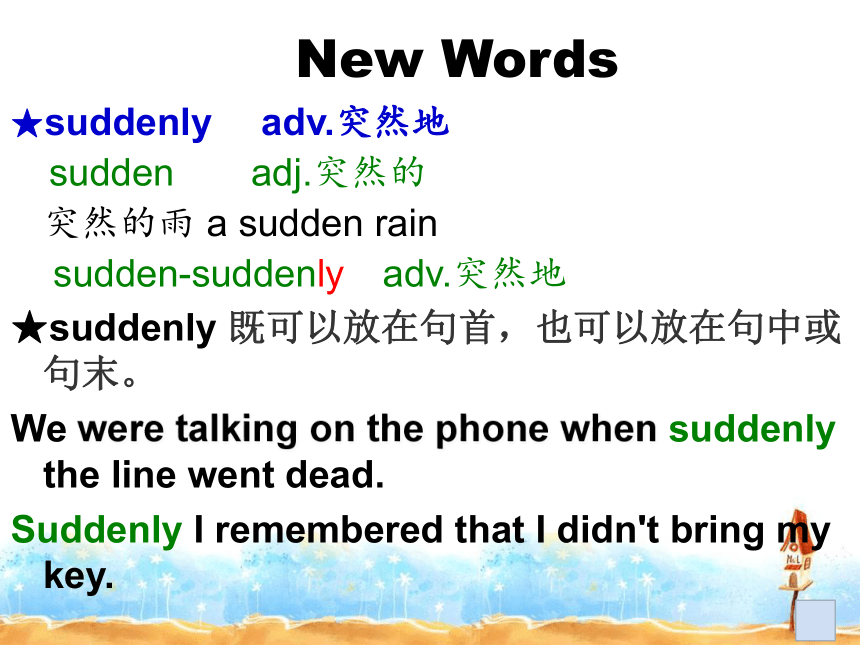
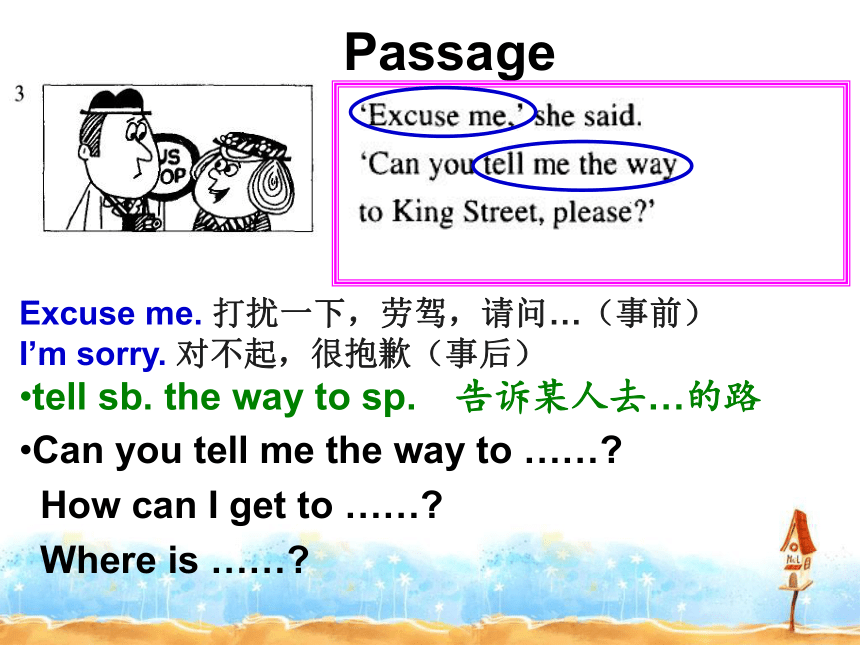
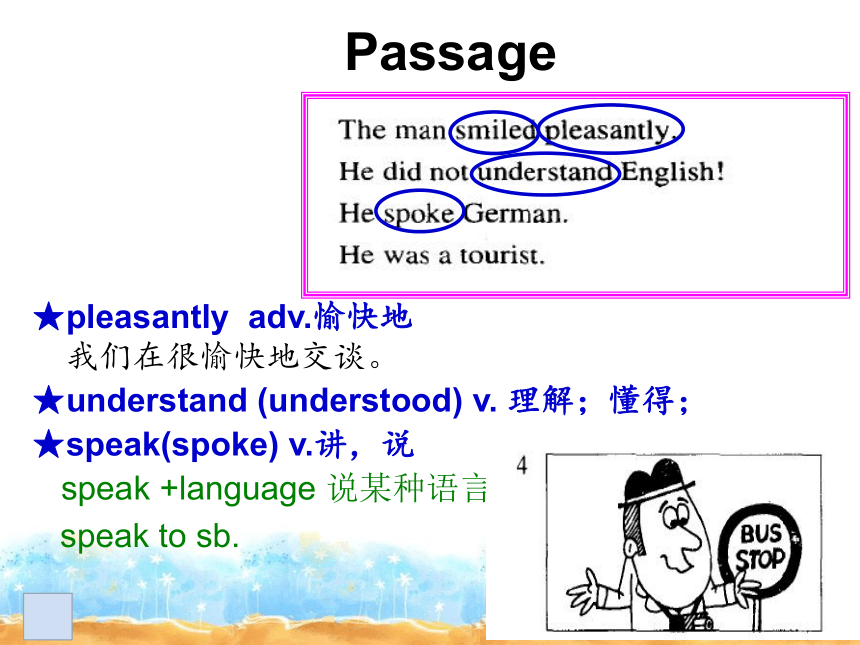
文档简介
(共46张PPT)
Lesson 73-74
New Concept English 1
Warm-up Free talk
About traveling
Lesson 73 The way to King Street
Do you know the way to King Street
Why did the man need a phrasebook
Passage
The way to King Street
know …well 对……了解
and 此处指的是“因此,所以”这里的and指的是“目的”
lose-lost
lose one's way 迷路
New Words
★week n. 周
this week, last week等,前面不能加介词
the week before last 上上周
the week after next 下下周
★London n.伦敦
London is the capital of Britain.
the capital of… …的首都
英国的英文全称:
The United Kingdom of Great Britain and Northern Ireland
大不列颠及北爱尔兰联合王国
New Words
ask the way 问路
ask sb. sth. 问某人某事。ask sb for sth向某人要某物
say-said
say to oneself 心中暗想(不出声地)
反身代词:
myself, yourself, himself, herself, itself,ourselves, yourselves, themselves
Passage
★suddenly adv.突然地
sudden adj.突然的
突然的雨 a sudden rain
sudden-suddenly adv.突然地
★suddenly 既可以放在句首,也可以放在句中或句末。
We were talking on the phone when suddenly the line went dead.
Suddenly I remembered that I didn't bring my key.
New Words
Excuse me. 打扰一下,劳驾,请问…(事前)
I’m sorry. 对不起,很抱歉(事后)
tell sb. the way to sp. 告诉某人去…的路
Can you tell me the way to ……
How can I get to ……
Where is ……
Passage
★pleasantly adv.愉快地
我们在很愉快地交谈。
★understand (understood) v. 理解;懂得;
★speak(spoke) v.讲,说
speak +language 说某种语言
speak to sb.
Passage
★ smile v. 笑
smile at
smile n.
a sweet smile
★smile a…smile
She smiled a pleasant smile. =She smiled pleasantly.
她愉快地笑了。
smile
n. 微笑;笑容
vi. 微笑
laugh
n. 笑,出声的笑;
引人发笑的事或人
vi. 笑 laugh at + sb.嘲笑某人
New Words
★hand n.手;指针
put-put(动词和过去式同形)
put…into…把…放进…里
★pocket n.衣袋
零用钱 pocket money
take-took
take out 拿出,取出
★phrasebook n.短语手册,常用语手册
Passage
★phrase n.短语
★slowly adv.缓慢地
Passage
Find out adverbs from the passage:
1.suddenly
突然地
2.pleasantly
愉快地
3.slowly
慢慢地
Passage
The way to King Street
Last week Mrs. Mills went to London. She does not know London very well, and she lost her way.
Suddenly, she saw a man near a bus stop. 'I can ask him the way.' she said to herself.
'Excuse me,' she said. 'Can you tell me the way to King Street, please '
The man smiled pleasantly. He did not understand English! He spoke German. He was a tourist.
Then he put his hand into pocket, and took out a phrasebook.
He opened the book and found a phrase. He read the phrase slowly. 'I am sorry,' he said. 'I do not speak English.'
test
n.周
n.伦敦
adv.突然地
n.公共汽车站
v.微笑
adv.愉快地
v.懂,明白
v.讲,说
n.手
n.衣袋
n.短语手册,常用语手册
n.短语
adv.缓慢地
week
London
suddenly
bus stop
smile
pleasantly
understand
speak
hand
pocket
phrasebook
phrase
slowly
Lesson 74
What did they do
New words:
hurriedly adv.匆忙地
cut (cut) v.割,切
thirstily adv.口渴地
go (went) v.走
greet v.问候,打招呼
★hurriedly adv.匆忙地 = in a hurry
hurry n.匆忙
我们不得不匆忙的说再见。
We have to say goodbye in a hurry / hurriedly.
★cut (cut)v.割,切
翘课
cut class
Cut it out.
打住,停住吧! = shut up
haircut
action --- cut
★thirstily adv.口渴地
thirsty adj.口渴的
★greet v.问候,打招呼
greet sb.
Review the words:
hurriedly adv.匆忙地
cut (cut) v.割,切
thirstily adv.口渴地
go (went) v.走
greet v.问候,打招呼
He shaved hurriedly this morning and cut himself badly.
先找动词再找副词
找出副词修饰哪个动词
翻译句子
shave (shaved) vt. 刮胡子
hurriedly adv. 匆忙地
He took a cake and ate it quickly.
eat (ate) v.吃
quickly adv.快地
I gave him a glass of milk and he drank it thirstily.
drink (drank) v.喝
thirst 口渴
thirsty adj 口渴的
thirstily adv 口渴地
I met her in the street the day before yesterday and she greeted me warmly.
greet (greeted) v.问候,打招呼
the day before yesterday 前天
The bus went slowly yesterday afternoon and we arrived late.
go (went) v. 去,出发
arrive (arrived) v.到达
slowly adv. 缓慢地
late adv.迟地,晚地
They worked very hard this morning.
work v. 工作
hard adv.努力地
We enjoyed ourselves very much last night.
enjoy (enjoyed) v.享受
very much adv.非常
He swam very well this afternoon.
swim(swam) v. 游泳
well adv. 好
Grammar
形容词、副词
She is a good student, and she works hard. 本句中,good 就是形容词,而hard 则是副词。
形容词用来修饰名词或代词, 表示人或事物的性质, 状态,和特征。
副词是一种用来修饰动词,形容词,副词或全句的词,说明时间,地点,程度,方式等概念。
(adv:副词adj:形容词)
形容词变副词的规则:
1.一般情况下在形容词词尾直接加-ly。
如:
real-really; helpful-helpfully;
careful-carefully; hopeful-hopefully;
slow-slowly; quick-quickly;
quiet-quietly ; pleasant-pleasantly
Grammar
形容词变副词的规则:
2. 以辅音字母加y结尾的形容词要变y为i,然后再加-ly。
如:
busy busily
angry angrily
easy easily
happy happily
Grammar
形容词变副词的规则:
3.某些以辅音字母加不发音的字母e结尾和以-ue结尾的形容词要先去掉e,然后再加-ly。
如:
terrible terribly
true truly
Grammar
需注意: friendly; motherly; lovely等词是形容词而非副词。
在英语中,有些词既可以作形容词,又可以作副词,如early, much, fast, little, wide, loud等。 由于这类词词性虽不同,但词形却一样,这就需要大家学会在特定语境中判断它们各自的词性。
Grammar
例句:Thank you very much. (adv.)
There is much water in the river. (adj.)
The music is too loud. Please turn it down. (adj.)
He speaks loud enough. So everyone in the room can hear what he said. (adv.)
另外,还有一类副词和形容词词义相同,但拼写却不同,如well和good。
He speaks good(adj) English. 。
He speaks English well(adv). 。
hard---hard late-late good----well
Grammar
Example:
She smiled ______ . (pleasant)
1 He read the phrase ______ . (slow)
2 He worked ______ . (lazy)
3 He cut himself ______ . (bad)
4 He worked ______ . (careful)
5 The door opened ______ . (sudden)
slowly
lazily
badly
carefully
suddenly
pleasantly
一般过去时
基本结构:主语+动词过去式+其他;
否定形式①was/were + not;
②在行为动词前加didn‘t,同时还原行为动词;
一般疑问句Did+主语+do+其他。
时态 用法
动词形式 肯定句 否定句 一般疑问句及其回答 特殊疑问句及其回答
一般现在时 一般、经常、习惯、真理 原形/三单
do/does I do…
He does… I don’t do…
He doesn’t do … Do you like milk
Yes, I do. What do you like
I like milk.
一般过去时
过去某一时
间做了某事 过去式
did I did…
He did… I didn’t do…
He didn’t do… Did you drink milk
Yes, I did. What did you drink
I drank milk.
1. The man ____(speak) very slowly, but I didn’t understand him.
2.The tourist ____(lose) his way in Hong Kong.
3.My friend ____(meet) me at the railway station.
4.Jill's father _____(give) her the key to the front door.
5.Mrs.Mills ____(is) in London last week.
6.She ____(go) to Paris last year .
7.The man _____(drink) their tea very quickly.
8.We ____(see) our friends at the bus stop.
9. The students_________ (understand) me because I spoke very slowly and carefully.
10. The boy _______(find) some money and _____(take) it to his teacher.
spoke
lost
met
gave
was
went
drank
saw
understood
found
took
Exercise
swam
did
cut
read
said
Exercise
1.My father ____ his hand into the bag, and ____ out a story book.
A. putted; taked B. put; take C. put; took D. Putting; taking
2.The waiter smiled ____ and showed me the menu.
A. pleasantly B. friendly C. pleasant D. friend
3.It suddenly started to rain. We ran into the house ____
A. hurry B. hurried C. hurriedly D. in hurry
4.John can speak English ____
A. very welly B. very goodly C. very good D. very well
Exercise
Conclusion
Retell the text
Last week ,Mrs. Mills ,went to...,
doesn't know... very well
got lost, saw a man, ask him the way
excuse..., tell...the way to...
smiled pleasantly, didn't understand
German, tourist,
put his hand into..., took out
opened..., found... read...slowly
sorry..., do not speak...
1 熟读课文及句子
2 背诵重点词汇和短语
Homework
Lesson 73-74
New Concept English 1
Warm-up Free talk
About traveling
Lesson 73 The way to King Street
Do you know the way to King Street
Why did the man need a phrasebook
Passage
The way to King Street
know …well 对……了解
and 此处指的是“因此,所以”这里的and指的是“目的”
lose-lost
lose one's way 迷路
New Words
★week n. 周
this week, last week等,前面不能加介词
the week before last 上上周
the week after next 下下周
★London n.伦敦
London is the capital of Britain.
the capital of… …的首都
英国的英文全称:
The United Kingdom of Great Britain and Northern Ireland
大不列颠及北爱尔兰联合王国
New Words
ask the way 问路
ask sb. sth. 问某人某事。ask sb for sth向某人要某物
say-said
say to oneself 心中暗想(不出声地)
反身代词:
myself, yourself, himself, herself, itself,ourselves, yourselves, themselves
Passage
★suddenly adv.突然地
sudden adj.突然的
突然的雨 a sudden rain
sudden-suddenly adv.突然地
★suddenly 既可以放在句首,也可以放在句中或句末。
We were talking on the phone when suddenly the line went dead.
Suddenly I remembered that I didn't bring my key.
New Words
Excuse me. 打扰一下,劳驾,请问…(事前)
I’m sorry. 对不起,很抱歉(事后)
tell sb. the way to sp. 告诉某人去…的路
Can you tell me the way to ……
How can I get to ……
Where is ……
Passage
★pleasantly adv.愉快地
我们在很愉快地交谈。
★understand (understood) v. 理解;懂得;
★speak(spoke) v.讲,说
speak +language 说某种语言
speak to sb.
Passage
★ smile v. 笑
smile at
smile n.
a sweet smile
★smile a…smile
She smiled a pleasant smile. =She smiled pleasantly.
她愉快地笑了。
smile
n. 微笑;笑容
vi. 微笑
laugh
n. 笑,出声的笑;
引人发笑的事或人
vi. 笑 laugh at + sb.嘲笑某人
New Words
★hand n.手;指针
put-put(动词和过去式同形)
put…into…把…放进…里
★pocket n.衣袋
零用钱 pocket money
take-took
take out 拿出,取出
★phrasebook n.短语手册,常用语手册
Passage
★phrase n.短语
★slowly adv.缓慢地
Passage
Find out adverbs from the passage:
1.suddenly
突然地
2.pleasantly
愉快地
3.slowly
慢慢地
Passage
The way to King Street
Last week Mrs. Mills went to London. She does not know London very well, and she lost her way.
Suddenly, she saw a man near a bus stop. 'I can ask him the way.' she said to herself.
'Excuse me,' she said. 'Can you tell me the way to King Street, please '
The man smiled pleasantly. He did not understand English! He spoke German. He was a tourist.
Then he put his hand into pocket, and took out a phrasebook.
He opened the book and found a phrase. He read the phrase slowly. 'I am sorry,' he said. 'I do not speak English.'
test
n.周
n.伦敦
adv.突然地
n.公共汽车站
v.微笑
adv.愉快地
v.懂,明白
v.讲,说
n.手
n.衣袋
n.短语手册,常用语手册
n.短语
adv.缓慢地
week
London
suddenly
bus stop
smile
pleasantly
understand
speak
hand
phrasebook
phrase
slowly
Lesson 74
What did they do
New words:
hurriedly adv.匆忙地
cut (cut) v.割,切
thirstily adv.口渴地
go (went) v.走
greet v.问候,打招呼
★hurriedly adv.匆忙地 = in a hurry
hurry n.匆忙
我们不得不匆忙的说再见。
We have to say goodbye in a hurry / hurriedly.
★cut (cut)v.割,切
翘课
cut class
Cut it out.
打住,停住吧! = shut up
haircut
action --- cut
★thirstily adv.口渴地
thirsty adj.口渴的
★greet v.问候,打招呼
greet sb.
Review the words:
hurriedly adv.匆忙地
cut (cut) v.割,切
thirstily adv.口渴地
go (went) v.走
greet v.问候,打招呼
He shaved hurriedly this morning and cut himself badly.
先找动词再找副词
找出副词修饰哪个动词
翻译句子
shave (shaved) vt. 刮胡子
hurriedly adv. 匆忙地
He took a cake and ate it quickly.
eat (ate) v.吃
quickly adv.快地
I gave him a glass of milk and he drank it thirstily.
drink (drank) v.喝
thirst 口渴
thirsty adj 口渴的
thirstily adv 口渴地
I met her in the street the day before yesterday and she greeted me warmly.
greet (greeted) v.问候,打招呼
the day before yesterday 前天
The bus went slowly yesterday afternoon and we arrived late.
go (went) v. 去,出发
arrive (arrived) v.到达
slowly adv. 缓慢地
late adv.迟地,晚地
They worked very hard this morning.
work v. 工作
hard adv.努力地
We enjoyed ourselves very much last night.
enjoy (enjoyed) v.享受
very much adv.非常
He swam very well this afternoon.
swim(swam) v. 游泳
well adv. 好
Grammar
形容词、副词
She is a good student, and she works hard. 本句中,good 就是形容词,而hard 则是副词。
形容词用来修饰名词或代词, 表示人或事物的性质, 状态,和特征。
副词是一种用来修饰动词,形容词,副词或全句的词,说明时间,地点,程度,方式等概念。
(adv:副词adj:形容词)
形容词变副词的规则:
1.一般情况下在形容词词尾直接加-ly。
如:
real-really; helpful-helpfully;
careful-carefully; hopeful-hopefully;
slow-slowly; quick-quickly;
quiet-quietly ; pleasant-pleasantly
Grammar
形容词变副词的规则:
2. 以辅音字母加y结尾的形容词要变y为i,然后再加-ly。
如:
busy busily
angry angrily
easy easily
happy happily
Grammar
形容词变副词的规则:
3.某些以辅音字母加不发音的字母e结尾和以-ue结尾的形容词要先去掉e,然后再加-ly。
如:
terrible terribly
true truly
Grammar
需注意: friendly; motherly; lovely等词是形容词而非副词。
在英语中,有些词既可以作形容词,又可以作副词,如early, much, fast, little, wide, loud等。 由于这类词词性虽不同,但词形却一样,这就需要大家学会在特定语境中判断它们各自的词性。
Grammar
例句:Thank you very much. (adv.)
There is much water in the river. (adj.)
The music is too loud. Please turn it down. (adj.)
He speaks loud enough. So everyone in the room can hear what he said. (adv.)
另外,还有一类副词和形容词词义相同,但拼写却不同,如well和good。
He speaks good(adj) English. 。
He speaks English well(adv). 。
hard---hard late-late good----well
Grammar
Example:
She smiled ______ . (pleasant)
1 He read the phrase ______ . (slow)
2 He worked ______ . (lazy)
3 He cut himself ______ . (bad)
4 He worked ______ . (careful)
5 The door opened ______ . (sudden)
slowly
lazily
badly
carefully
suddenly
pleasantly
一般过去时
基本结构:主语+动词过去式+其他;
否定形式①was/were + not;
②在行为动词前加didn‘t,同时还原行为动词;
一般疑问句Did+主语+do+其他。
时态 用法
动词形式 肯定句 否定句 一般疑问句及其回答 特殊疑问句及其回答
一般现在时 一般、经常、习惯、真理 原形/三单
do/does I do…
He does… I don’t do…
He doesn’t do … Do you like milk
Yes, I do. What do you like
I like milk.
一般过去时
过去某一时
间做了某事 过去式
did I did…
He did… I didn’t do…
He didn’t do… Did you drink milk
Yes, I did. What did you drink
I drank milk.
1. The man ____(speak) very slowly, but I didn’t understand him.
2.The tourist ____(lose) his way in Hong Kong.
3.My friend ____(meet) me at the railway station.
4.Jill's father _____(give) her the key to the front door.
5.Mrs.Mills ____(is) in London last week.
6.She ____(go) to Paris last year .
7.The man _____(drink) their tea very quickly.
8.We ____(see) our friends at the bus stop.
9. The students_________ (understand) me because I spoke very slowly and carefully.
10. The boy _______(find) some money and _____(take) it to his teacher.
spoke
lost
met
gave
was
went
drank
saw
understood
found
took
Exercise
swam
did
cut
read
said
Exercise
1.My father ____ his hand into the bag, and ____ out a story book.
A. putted; taked B. put; take C. put; took D. Putting; taking
2.The waiter smiled ____ and showed me the menu.
A. pleasantly B. friendly C. pleasant D. friend
3.It suddenly started to rain. We ran into the house ____
A. hurry B. hurried C. hurriedly D. in hurry
4.John can speak English ____
A. very welly B. very goodly C. very good D. very well
Exercise
Conclusion
Retell the text
Last week ,Mrs. Mills ,went to...,
doesn't know... very well
got lost, saw a man, ask him the way
excuse..., tell...the way to...
smiled pleasantly, didn't understand
German, tourist,
put his hand into..., took out
opened..., found... read...slowly
sorry..., do not speak...
1 熟读课文及句子
2 背诵重点词汇和短语
Homework
同课章节目录
